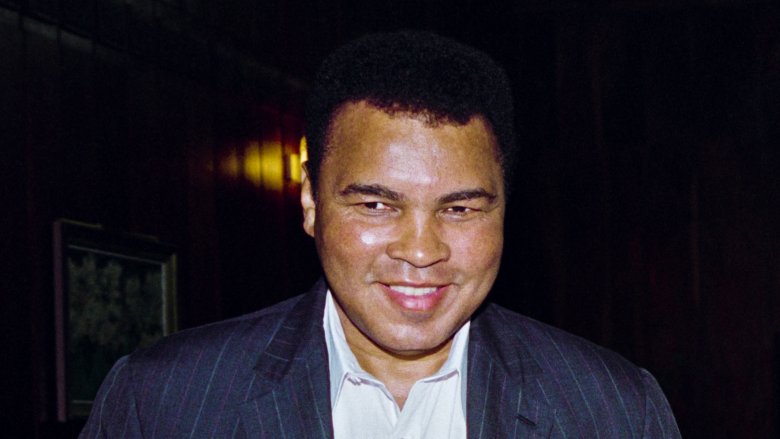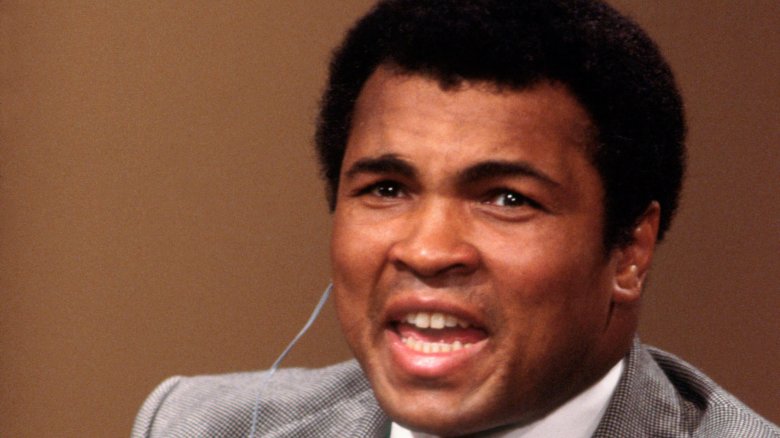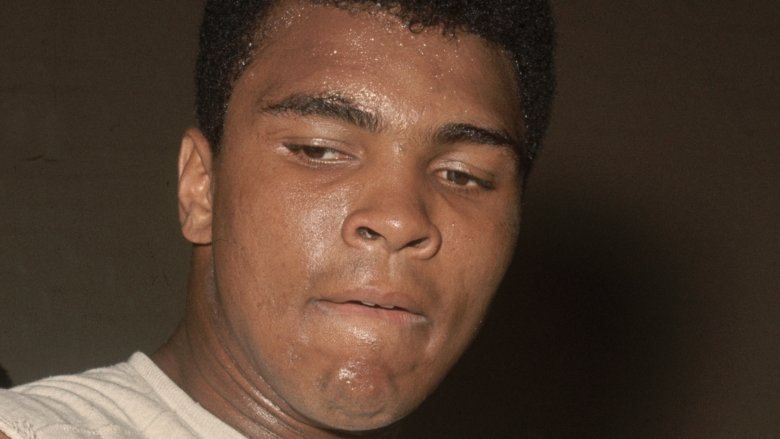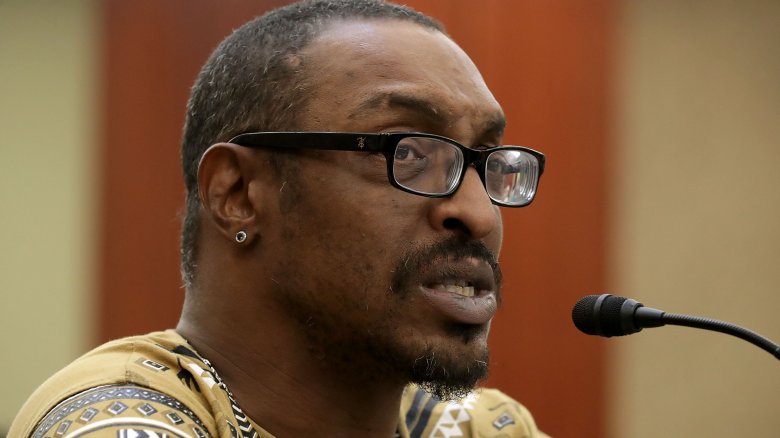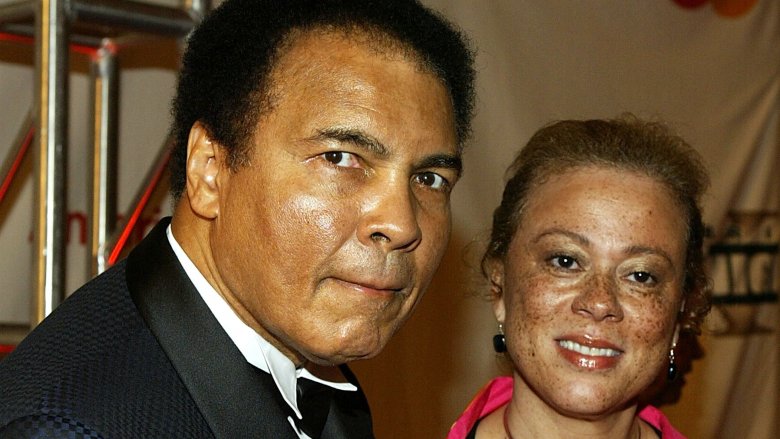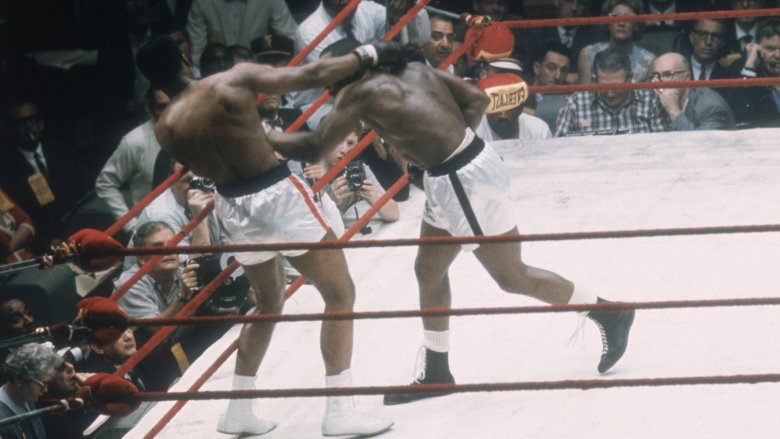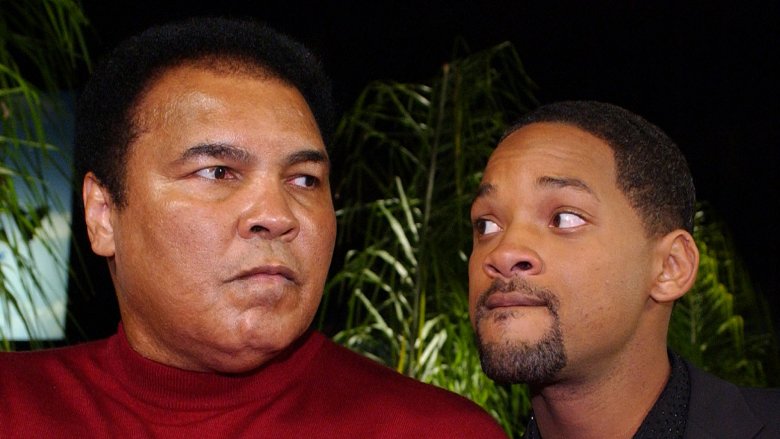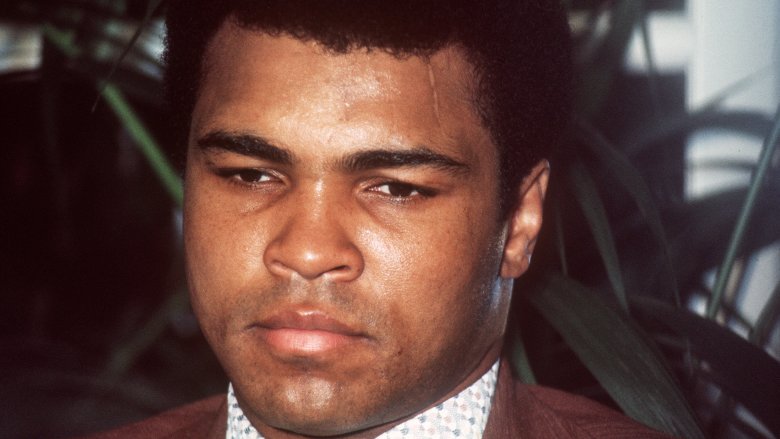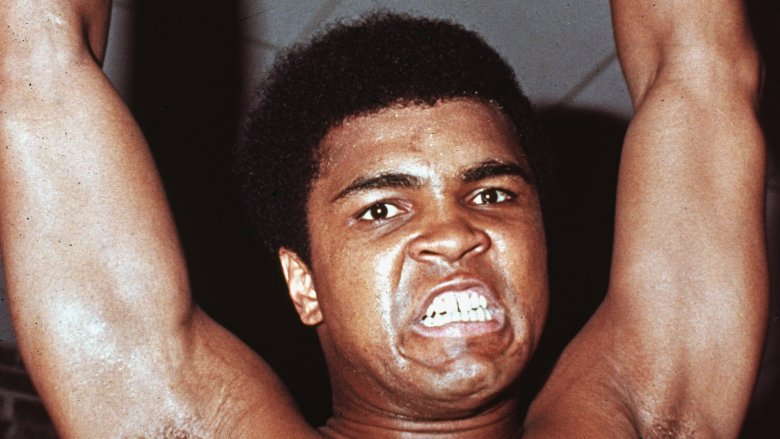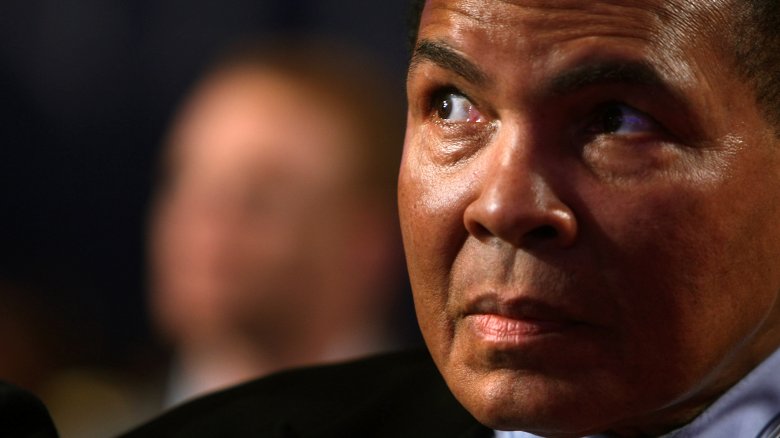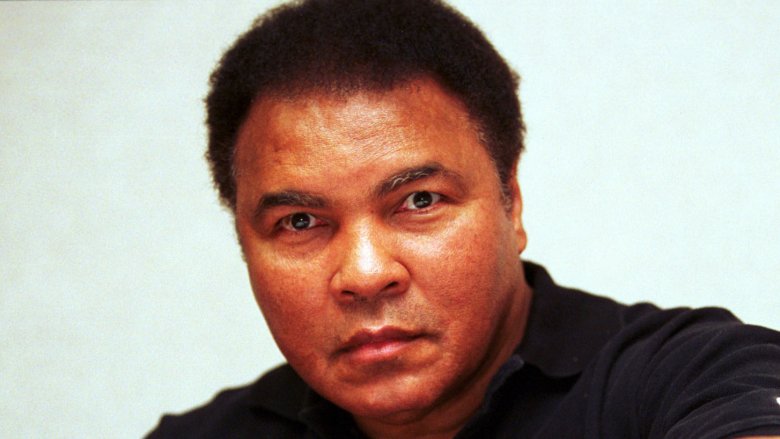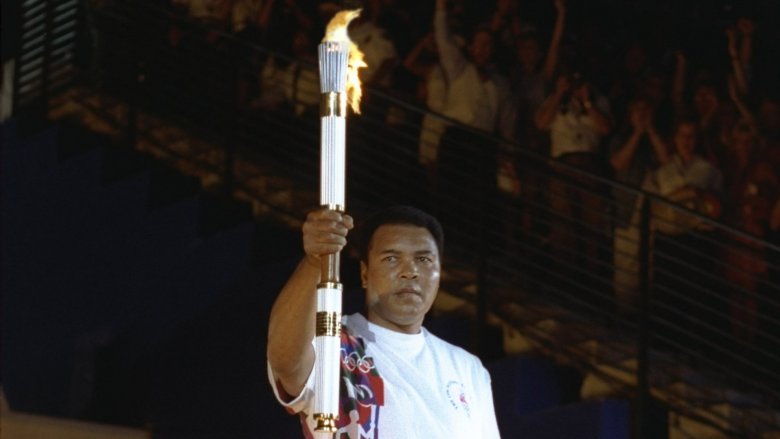Muhammad Ali's Tragic Real-Life Story
When people discuss the ever-famous Muhammad Ali, they often accentuate the positives and eliminate the negatives. They celebrate his boxing prowess, seemingly bottomless charisma, and civil rights advocacy. When covering his struggles, they tend to look for silver linings. We'll focus on the darker aspects of his existence. There will be little emphasis on accolades or charming anecdotes and few inspirational takeaways, but this is mainly the story of Ali's shortcomings, regrets, and suffering.
Nothing here is intended to downplay Ali's amazing accomplishments or otherwise detract from his image. He undeniably earned a permanent spot in the pantheon of cultural heroes, but he also displayed streaks of shocking villainy, and the awful price he paid for boxing glory illustrates the sometimes unbridgeable gap between success and well-being. To gloss over or soften these harsh realities ignores Muhammad Ali's humanity and transforms him into a myth. Here's a look at when The Greatest was at his worst.
He supported lynching interracial couples
In 1975 Muhammad Ali shared what he called "words of wisdom" with Playboy: "When we are right, no one remembers, but when we are wrong no one forgets." That's often true, but perhaps it didn't apply to him in the long run, because iironically in that same interview he said some incredibly wrong things that most people seem to have forgotten. How wrong? He advocated hanging people based on the people they're dating.
Back then Ali followed the teachings of the Nation of Islam and vehemently opposed rumble-in-the-jungle fever. His interviewer had heard he supported lynching interracial couples. When asked to clarify, Ali replied: "A black man should be killed if he's messing with a white woman." He further argued that if a Muslim woman dates a non-Muslim man, black or white, "Then she dies. Kill her, too." To bolster his case, he noted that historically whites "lynched n***ers for even looking at a white woman." Which ... yeah, that's sadly true, but a lot of people, even in the '70s, wanted that practice to stay in the past.
According to the Telegraph, for years Ali touted himself as "the true black man" and felt superior to black athletes who didn't hold his views. CBS contributor Terry Foster recalled that while feuding with Joe Frazier, Ali branded his rival "a traitor to black people" for supposedly conforming to white society. He also labeled Frazier an "Uncle Tom" and made monkey sounds at him. Per the Guardian, during a 1974 interview with BBC talk show host Michael Parkinson, Ali flat-out said that blacks and whites were engaged in "a spiritual war."
He slapped his first wife
In 1964 Herbert Muhammad, the son of Nation of Islam leader Elijah Muhammad, introduced Ali to waitress and model Sonji Roi. As detailed in the book Muhammad Ali: I am the Greatest, Roi said Ali asked her to marry him on their first date. Herbert thought this was a terrible idea. Muslim women were expected to dress conservatively and refrain from wearing makeup. In fact, Herbert warned Ali that Sonji Roi worked "at a cocktail place wearing one of those little bunny things on her behind."
Clearly happy with Roi's behind, Ali married her about a month after they met. About 10 months after they married Ali filed for an annulment. In his words, Roi "wouldn't do what she was supposed to do. She wore lipstick; she went into bars." The Guardian reported that in court Ali complained that men could see "the seams of her underwear" through her tight pants. He also derided Roi's choice to wear a knee-length red dress and makeup during proceedings, calling it "lust to the eye and embarrassing to me."
Ali grew so frustrated with his wife's disobedience that he slapped her. He later expressed remorse, saying the slap "hurt me more than it hurt her." Of course, that's doubtful since Ali was a professional boxer. Despite her husband's controlling behavior, Roi didn't want a divorce. But his Muslim brothers forced Ali to pick between love and religion.
His deeply unhappy son
Despite having a world's greatest boxer for a dad, Muhammad Ali Jr. (above) didn't have the greatest childhood. Ali Sr. had a hectic schedule, which didn't leave much room for father-son bonding. Because his mother was an actress, Junior was largely reared by his grandparents. Speaking with the New York Post in 2014, he couldn't recall having a single family meal.
When Ali was around he was a walking mirth dispenser, performing magic tricks, wearing scary masks, and generally making his kids smile. Unfortunately, being Ali's son also brought a lot of frowns. According to Junior, bullies constantly wanted to fight him, and he couldn't distinguish true friends from starry-eyed phonies. In his words, "I didn't know who really loved me." He ended up saddled with many of the problems of fame while reaping relatively few of the benefits himself (at the time, anyway).
Adulthood brought more sorrow for Muhammad Jr. His father's Parkinson's severely limited their ability to interact. Furthermore, he blamed Ali's wife Lonnie for widening the rift between himself and Ali. Also financially deprived, Junior alleged that he could barely take care of his wife and two kids and scraped by with the aid of charitable donations. That all changed once his father died. Muhammad Jr. reportedly inherited $6 million, and according to his wife, he abandoned her after Ali's funeral.
He battled a learning disability
In his heyday Ali was the Dr. Seuss of trash talk. But despite his clever use of words, he could scarcely read them growing up. Ali had undiagnosed dyslexia, which blighted his childhood. Citing writer Jonathan Eig, NPR noted that one of Ali's classmates considered him as "dumb as a box of rocks." Ali avoided failure by cheating his way through school. Even so, he nearly flunked out of high school and finished 376th out of 391, according to CBS.
In adulthood Ali made light of his struggles, quipping, "I never said I was the smartest, I said I was the greatest." But it must have felt lonely to be surrounded by people who couldn't understand his plight. As his fourth wife, Lonnie, told CBS, "If you can't read, you feel left out of everything." That's why she and Ali started Go The Distance, a reading program for black children.
'Muhammad Ali Syndrome'
With the help of statisticians, author Jonathan Eig estimated that Ali got "hit about 200,000 times" during his career, including during his 61 professional bouts, his numerous amateur bouts, during training, and through 500 exhibition rounds. About half of those punches likely struck his head. Even for someone who gets hit for a living that's a lot. But Ali intentionally made himself an in-ring punching bag during the latter years of his career, hoping to tire out opponents. It was basically what Rocky did to beat Mr. T, except Ali did it for a lot longer. "In fact," Eig explained, "he encouraged his sparring partners to hit him in the head" in a misguided effort to strengthen his cranium.
Ali's physician believed all those shots to the head had led him to Parkinson's. Unconvinced, Ali sought a second opinion from immunologist Rajko Medenica in 1988. As UPI recounted, Medenica diagnosed him with "Muhammad Ali syndrome." What's that, you ask? Because of years of exposure to household pesticides, Medenica said that Ali needed blood cleanings to rebound. Scientific research had already revealed that heavy pesticide exposure can increase the risk of contracting Parkinson's, but Medenica's treatments were likely ineffective. Less than a year later, Medenica was convicted of fraud, and until his death in 1997, he'd be hounded by lawsuits and charges of malpractice.
Regardless of what doomed Ali to his horrific illness, Ali definitely suffered the ravages of Parkinson's in later life.
The most hated athlete in America
Nowadays, Muhammad Ali seems cooler than Will Smith at his jiggiest, but he used to be the Nickelback of sports. The American public detested him for his outspokenness and religious beliefs. In fact, despite being the undefeated heavyweight champion, he spent 1966 boxing abroad because U.S. promoters didn't see him as bankable, per CBC. But once he refused to fight in the Vietnam War, he wasn't allowed to fight anywhere.
As The Atlantic detailed, America declared Ali eligible for the draft in 1966. The champ blasted the idea, announcing, "My conscience won't let me go shoot my brother, or some darker people, or some poor hungry people in the mud for big powerful America." After railing against American racism, he concluded with, "Just take me to jail." Uncle Sam obliged. In 1967 Ali resisted his military induction in person, resulting in a criminal conviction, $10,000 fine, and five-year prison sentence. Plus, he was stripped of his championship and banned from boxing.
This happened before the Vietnam War became the Nickelback of conflicts, so in addition to legal trouble Ali was condemned as "a disgrace to his country, his race, and what he laughingly describes as his profession." Ali successfully appealed his conviction, which kept him out of prison. But he was also barred from boxing for three years. Trainer Angelo Dundee lamented that the ordeal robbed Ali of "the best years of his life," perhaps a level of greatness we can only imagine.
The agonizing end of his career
Watching a loved one get furiously punched in the face is never fun, but as Ali's career waned, it was especially painful for his daughters Maryum and Hana. In an interview with the Independent, Maryum relived the horror of watching Ken Norton fracture her dad's jaw. She "thought he'd never talk again." Hana couldn't bring herself to watch Ali's final fights, calling them "too depressing." It eventually got so bad that his daughters sometimes prayed he would lose so his career could end.
Perhaps Ali should have retired in 1971. That was when Dr. Ferdie Pacheco first observed "signs of lasting brain damage" in the boxer. He had just fought and lost a hellacious fight against Joe Frazier. Even though he was advised to quit, Ali hopped back in the ring in almost no time. During a 27-month period he had an excessively high 13 bouts. Why? According to Dr. Pacheco, Ali did it for the "quick money."
Ali's money disappeared almost as quickly as he pulled it in. As Eig elaborated, the boxer had wasted mountains of cash on his marriages, made countless loans to friends, and supported his father, brother, and others financially. In 1976 he had a wallet-ruining divorce. He then remarried and had another child. To compensate, he had match after match without sufficient recovery time. It was only a matter of time before more than his jaw broke.
He was criticized by Martin Luther King and his own father
Ali was raised a Baptist, but certain aspects of Christianity bothered him. As the Courier Journal reported, Ali didn't feel he could relate to biblical figures because they were always assumed to be white. Looking for a source of racial pride, he found the Nation of Islam during the early 1960s. In the years that followed, people would shame him for it.
Part of the problem was that the Nation considered white people to be Satan incarnate. As described in Muhammad Ali: I Am the Greatest, in 1963 Malcolm X mocked John F. Kennedy's assassination as "the chickens coming home to roost." So people were ticked like time bombs when Ali hung out with Malcolm while he was training to fight heavyweight champion Sonny Liston. In fact, the fight was almost canceled by an incensed promoter.
Ali's controversial affiliation drew fire from all directions. In 1964 his father told the press his son had been "brainwashed" and called the Nation of Islam corrupt. When Ali declared his allegiance to the Nation of Islam, he got criticized by civil rights icons, including Martin Luther King and Jackie Robinson, and a sports writer portrayed him as a purveyor of hate. Ali's anti-white leanings also made the FBI nervous, and as the New York Times detailed, the bureau thoroughly investigated him through the years.
His falling-out with Malcolm X
In 1962 Muhammad Ali, then still known as Cassius Clay, attended a Saviour's Day rally in Chicago. Put on by the Nation of Islam, the event kicked off with a speech by civil rights activist and verbal pugilist Malcolm X. According to historian Johnny Smith, the speech utterly wowed Ali, who in turn impressed Malcolm with his magnetic personality. It was the start of a beautiful friendship. Malcolm became "part father figure, part big brother" to Ali and converted him to the Nation of Islam.
As time went by, that beautiful friendship started to crumble. In 1964 Ali publicly declared himself a Black Muslim, but Malcolm began denouncing the faith. As the Independent explained, the civil rights leader now rejected the Nation of Islam's anti-white philosophy and derided its leader Elijah Muhammad as "a hypocritical womanizer" who knew practically nothing about traditional Islam. He invited Ali to follow him on a new spiritual journey. But the boxer "just wasn't ready to question [Elijah's] teaching."
Ali coldly rebuffed Malcolm, an act that ended their friendship. Ali eventually realized that "color doesn't make a man a devil." He even left the Nation to become a Sunni Muslim. But by that point Malcolm X had been assassinated, preventing Ali from making amends. He later admitted, "Turning my back on Malcolm was one of the mistakes I regret most in my life."
His body became a prison
Ali first exhibited telltale symptoms of Parkinson's disease in 1981. Once agile and articulate, he slurred his words and made slow, shaky movements. He was formally diagnosed in 1984 at age 42. Medication slowed the advance of the illness, but as The Guardian pointed out, "the condition progresses unpredictably," creating other complications such as insomnia and depression. The end result, sadly, remained the same. He would go from being unable to control his movements to being immobile.
Meanwhile, Ali's mind remained sharp, per CBS. So as his body shut down and his speaking ability evaporated like rain, he fully understood but couldn't fully express how he felt. Of course, not everyone had such a dreary take. GQ contributor Peter Richmond visited Ali in 1998 and saw not tragedy, but triumph. He marveled at how content the ex-athlete seemed as he labored to eat a forkful of cake. He saw divine meaning when Ali pretended to levitate after struggling to even stand.
Awed by his experience, Richmond wrote that Ali had never seemed godlier. But what the author saw as contentment might have been a face that couldn't show frustration. Per the Mayo Clinic, Parkinson's impairs a person's ability to make facial expressions. And while Ali's tenacity is unquestionable, one has to wonder whether Richmond simply witnessed a man clinging to the fading vestiges of his former self.
He died of sepsis
In 2016, Muhammad Ali was a 74-year-old shell of his former self. After a decades-long bout with Parkinson's the man whose lightning-fast hands had brought him championships, fame, and money could no longer sign his own name, per USA Today. Veronica Porsche, the third of Ali's four wives and the mother of two of his children, remarked that she hadn't talked with her ex-husband "for a long time" because he couldn't talk. Amid those hardships, Ali endured what NBC contributor Dr. Natalie Azar described as "a huge insult."
Ali contracted an unnamed respiratory ailment which sent his already-weakened anatomy into panic mode. The result was sepsis, a blood-based inflammatory response to illness that wreaks havoc. In an attempt to heal, Ali's body essentially killed itself. He went into septic shock, and his organs failed in quick succession. The last organ to die was his heart, which reportedly outlasted the rest of his body by 30 minutes.
